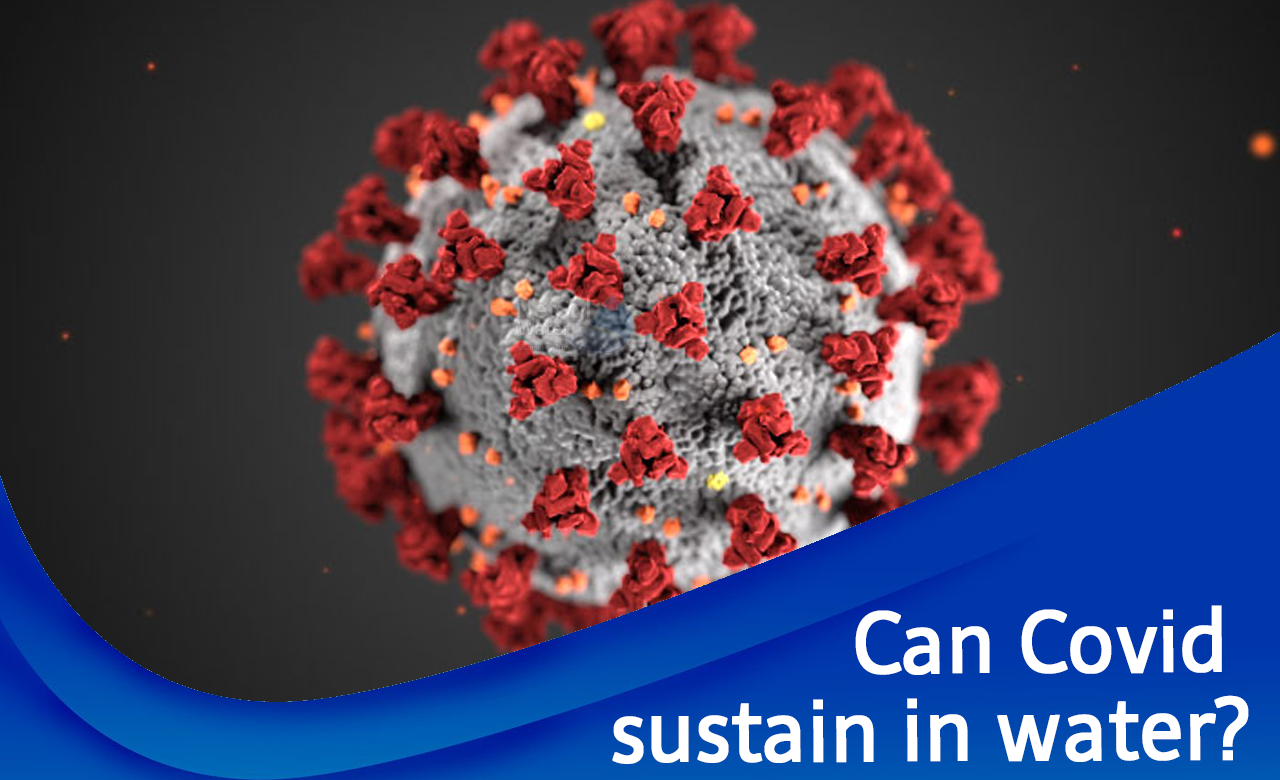Water plays an important role in your life. It's what you drink, what you wash your hands with, what you bathe in, and what many of us swim in. Water makes up more than half of your body weight, so you might say you almost live in it. You might be wondering, when you turn on the faucet to fill up another glass of water, if the novel coronavirus that causes COVID-19 can live in it as well.
Corona viruses (CoV) are a broad family of viruses that cause a wide range of illnesses, from the common cold to more serious conditions including Middle East Respiratory Syndrome (MERS-CoV) and Severe Acute Respiratory Syndrome (SARS) (SARS-CoV). The recent outbreak of coronavirus disease 2019 (COVID-19) has turned into a global public health crisis. SARS-CoV-2, the virus that causes COVID-19, is transmitted from person to person by droplets or direct contact. Since SARS-CoV-2 (along with other coronaviruses) has been detected in certain patients' faeces and anal swabs, the possibility of fecal-oral (including waterborne) transmission must be researched and clarified. The goal of this blog is to compile research findings on CoV in water environments.
The blog includes studies on three key topics:
1. CoV persistence/survival in waters
2. CoV incidence in water environments
3. Strategies for CoV recovery from waters.
According to data available,
- 1. CoV has a low environmental stability and is very sensitive to oxidants like chlorine
- 2. CoV appears to be inactivated significantly faster in water than non-enveloped human enteric viruses with known waterborne transmission
- 3. Temperature is an important factor influencing viral survival (the titer of infectious virus declines more rapidly at 23°C–25 °C than at 4 °C).
- 4. More research is needed to adapt the methods commonly used for sampling and concentration of enteric, non-enveloped viruses from water environments to enveloped viruses
- 5. There is no current evidence that human coronaviruses are present in surface or ground waters or are transmitted through contaminated drinking water
Fortunately, COVID-19 has not been discovered in drinking water, according to the Centers for Disease Control and Prevention (CDC), but what about recreational water sources that hot tubs, pools, and water parks all rely on? There is no evidence that the virus may be shared between people in communal recreational water supplies, which is actually good news.The evidence-based knowledge presented in this research can be used to aid risk analysis processes in the drinking and wastewater chains (i.e., water and sanitation safety planning) in order to protect human health from coronavirus exposure through water.
COVID-19 AND SEWER SYSTEMS
COVID-19 is caused by a virus that has been discovered in untreated wastewater. Researchers aren't sure if this virus can make people sick if they're exposed to untreated wastewater or sewage systems. To date, there is no indication that this has happened. The danger of transmission of the COVID-19 virus through properly constructed and maintained sewerage systems is currently regarded to be low.The available data suggests that typical municipal and individual septic system wastewater treatment techniques should inactivate the virus that causes COVID-19, according to researchers. As new information on COVID-19 transmission becomes available, the CDC is analyzing it.
The virus that causes COVID-19 should be protected from wastewater employees using standard precautions connected with wastewater treatment plant operations. Engineering and administrative controls, hygiene measures, particular safe work procedures, and personal protective equipment (PPE) are all examples of standards that must be followed while dealing with untreated wastewater. Workers in the wastewater management industry, including those at wastewater treatment facilities, do not need any additional COVID-19 protection.
CONCLUSION
COVID-19 and water appear to be a difficult combination to manage, but the CDC's research and analysis thus far suggests that the virus cannot be spread through water. The water management experts' greatest advice is to be informed about legislation and suggestions at all levels of government, and to ensure that your employees are following best practices.COVID-19 is not transmitted through drinking water. You also can't get COVID-19 from swimming in a pool or a pond. However, if you go to a crowded swimming pool and are in close proximity to other people, and someone is infected, you will undoubtedly be impacted. As a result, it's critical to maintain physical distance even in swimming pools.




